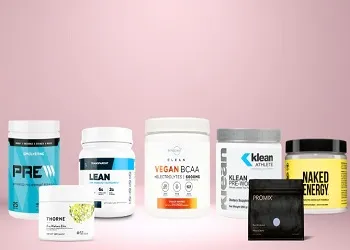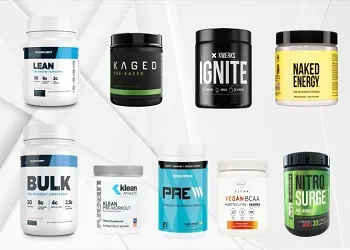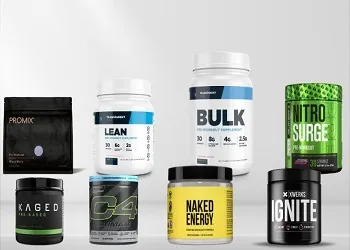When it comes to electrolytes, your initial thoughts may go straight to sports drinks or electrolyte tablets.
However, you don’t necessarily need to gulp down Gatorade to replenish electrolytes. There are numerous foods and drinks high in electrolytes that you can consume to maintain a healthy electrolyte balance.
There are a lot of sexy marketing tactics for electrolyte-infused waters and electrolyte tablets touting their product’s benefits to rehydration.
However, most healthy people maintain an adequate electrolyte balance naturally and don’t have to worry too much about replenishing lost electrolytes.
Key Points
- Electrolytes are electrically charged minerals that perform various functions in the body, including nerve function and muscle contraction.
- In the athletic world, the main electrolyte to pay attention to is sodium, as it is lost in the greatest amounts through sweat.
- The best way to get electrolytes is through a healthy diet and adequate hydration. Water is typically the cheapest option and lowest in sugar, but other beverages count toward daily fluid intake like milk, coconut water, juice, and smoothies, which all contain electrolytes.
- Those that workout in intense heat, endurance athletes doing high-intensity training for over an hour, or those that are particularly salty sweaters may require electrolyte replenishment during or after workouts.
Table of Contents
What Are Electrolytes?
In short, electrolytes are minerals that carry an electric charge. The most common electrolytes in the human body include sodium, potassium, phosphorus, calcium, chloride, and magnesium.
Sodium
Sodium is typically lost in sweat in the greatest amounts. Just bear in mind that with sodium, there is no need to go overboard when replenishing. Unfortunately for health outcomes, most people get plenty of sodium in their diet already through packaged food, meats, and fast food, which clearly aren’t the best sources. The recommended amount of daily sodium intake for adults is 1500 mg/day with no more than 2300 mg/day.
Potassium
Potassium helps regulate fluid balance, muscle contractions, and nerve signals. It is also lost in sweat with sodium. The RDA for potassium is 3400 mg/day for men and 2600 mg/day for women.
Phosphorus
Phosphorus is involved in muscle contraction and nerve function. The RDA is 700 mg/day.
Calcium
Most calcium in the body is stored in the bones. However, it’s also needed for various functions. The RDA for calcium is 1000 mg/day for adults under 70 and 200 mg/day for adults over 70.
Chloride
You may recognize chloride from being attached to sodium as sodium chloride or table salt. The recommended intake for chloride is 2300 mg/day. Chloride levels tend to follow sodium levels.
Magnesium
Magnesium is crucial for nerve function and also supports muscle contractions, heart health, and energy production. The RDA is 420 mg/day for men and 320 mg/day for women.
Electrolytes have many functions in the body, but their primary roles are to help regulate nerve and muscle function, maintain pH levels, and also manage water balance in and around your cells.
So, Do They Need to be Replenished?

Most drinking water sources contain some levels of these minerals, unless it is labeled as “distilled” which means it is the purest form of water where the electrolytes have been removed. In the majority of cases, people can remain adequately hydrated through good old fashioned water and a healthy diet. However, there are some exceptions.
Although relatively uncomplicated, maintaining electrolyte balance in the body is crucial.
They are lost through bodily fluids like sweat and urine. Sodium, chloride, and potassium are the ones lost in sweat.
Does replacing sodium help improve athletic performance? In some instances, yes. Most people get enough through diet, but it varies based on age, physical activity level, and climate. For endurance and ultra-endurance sports, the American College of Sports Medicine (ACSM) recommends an intake of 300 to 600 milligrams of sodium per hour of exercise.
Elite athletes, extreme sweaters, endurance athletes, and those that do strenuous activity in the heat may have to pay closer attention to their fluid balance. There is some research to suggest that electrolyte beverages are further enhanced when consumed alongside carbohydrates.
Since body fluid loss during extended exercise can negatively impact cardiovascular function, a meta-analysis studied the effects of various drinks on hydration changes during exercise. The results indicated that hypotonic carbohydrate-electrolyte drinks, when consumed throughout exercise, offer the most significant hydration benefits compared to isotonic, hypertonic, and water options.
Common Sources of Electrolytes

Healthy Foods High in Electrolytes
- Bananas: Nearly everyone knows the fruit that is renowned for its potassium content.
- Spinach: Packed with magnesium, potassium, and calcium, spinach is an electrolyte powerhouse.
- Avocados: High in potassium, avocados also provide healthy fats and fiber.
- Sweet Potatoes: Besides being a rich source of potassium, sweet potatoes also offer magnesium and calcium.
- Beans and Lentils: These are good sources of potassium and magnesium.
- Coconut Water: Often dubbed “nature’s sports drink,” coconut water is filled with potassium, magnesium, and sodium.
- Dairy Products: Milk, yogurt, and cheese are significant calcium sources, crucial for bone health and muscle function.
- Nuts and Seeds: Seeds, especially pumpkin seeds, chia seeds, almonds, and cashews, are magnesium-rich.
- Oranges and Orange Juice: These provide a good amount of potassium.
- Pickles and Pickle Juice: Pickled products like this are quite high in sodium.
Homemade Electrolyte Drinks

If you’re after an electrolyte drink that’s low in sugar, you could always mix up your own concoction. Try mixing coconut water, lemon, lime, and salt for a refreshing electrolyte-infused beverage.
A fruit smoothie is another healthy and homemade go-to post-workout or rehydration beverage. Add in fruits, vegetables, seeds, salt, and coconut water mixed with any other of your regular smoothie additions like protein or fats.
Electrolyte Packets & Tablets
Products like Nuun, Liquid IV, and LMNT can be used before, during, or after exercise to rehydrate. As discussed above, for most people, water will be enough to maintain adequate hydration. Though if you’re not a huge fan of plain water and these tasty electrolyte products help you drink more water, then that’s a benefit in itself.
Electrolyte Water
Most drinking water has trace amounts of electrolytes. Some companies increase the mineral content like potassium and sodium and call their product electrolyte water.
Sports Drinks
Drinking sports drinks for their electrolytes isn’t inherently bad, but just remember that they can be high in sugar.
Electrolyte Imbalance
Electrolyte imbalances mean that some electrolyte levels are too high or too low. This can be caused by certain medical conditions, dehydration from sickness or sport, and some medications. There are serious instances of electrolyte imbalances that require immediate medical attention, but those are rare.
Dehydration is when someone is low on fluids, which can also be associated with an electrolyte imbalance. Dehydration isn’t normally serious, but it should be addressed sooner rather than later. Signs of dehydration in adults may include a darker urine color, headache, fatigue, dizziness, dry mouth, fast heart rate, loss of appetite, flushed skin, swollen feet, muscle cramps, chills, and constipation.
Signs of an electrolyte imbalance can include irritability or confusion, diarrhea, constipation, fatigue, headaches, irregular heart rate, muscle cramps or spasms, nausea, vomiting, and numbness in the extremities.
Best Practices for Maintaining Fluid and Electrolyte Balance
- Don’t overuse over-the-counter diuretics.
- Drink plenty of water to remain hydrated, but don’t overdo it in a short period of time.
- Keep your dietary salt intake low.
- Know when and why you may want to supplement with electrolytes.
Instances Where Electrolyte Beverages Make Sense

- It’s best to avoid working out in intense heat, but if you do, make sure to stay hydrated and consider supplementing your fluids.
- People who sweat profusely lose more electrolytes through sweat. That makes sense, right? These folks may have a greater need for supplementation.
- Any sickness that involves diarrhea and vomiting can cause someone to lose a lot of fluids. This is another time when electrolytes may be appropriate.
- Endurance and ultra-endurance athletes
- Take note if you are a “salty sweater” or not. Salty sweaters may have to put greater emphasis on replenishing electrolytes,
- Those that follow a very low-salt diet and participate in moderate to vigorous exercise where they sweat may need some extra sodium to support their levels.
- If you’ve done strenuous exercise for over an hour, you may need to replenish electrolytes, especially sodium, with fluids like water or a low-sugar sports drink.
- Some medications affect electrolyte levels. However, this is something you should discuss with your doctor before messing with supplements.
If you are questioning the impact of your fitness regime on your fluid and electrolyte levels, weigh yourself before and after a workout to determine the amount of fluid that is lost. This can serve as an indicator if you may need to replenish some electrolytes or not.
Conclusion
A balanced diet rich in fruits, vegetables, dairy, and lean meats is typically sufficient for most people to maintain optimal electrolyte levels. While sports drinks can be helpful in situations of excessive sweating or physical activity, it’s always best to rely on natural sources for everyday nutrition.
Frequently Asked Questions (FAQs)
What is the best source of electrolytes?
As with most things when it comes to health and sports nutrition, whole food is the best source of the electrolytes our bodies need.
How do I get more electrolytes naturally?
Make sure your fluid intake is up to par. Remember, fluid doesn’t just mean water. It can also include beverages like juice, coconut water, and milk. Also, eat high-electrolyte foods like bananas, watermelon, spinach, nuts, and dairy products.
Which drink has the most electrolytes?
If you’re just after drinks with the most electrolytes, some of the top contenders are sports drinks like Gatorade or powders like Liquid IV. However, if you’re after a more natural option, beverages like orange juice, coconut water, milk, and smoothies all have substantial amounts of electrolytes.
What are signs of low electrolytes?
It depends on which one is low and how low it is, but signs of low electrolytes can include fatigue, dizziness or confusion, headache, rapid heart rate, and even vomiting.
References
American Heart Association. (2021, November 1). How much sodium should I eat per day? Www.heart.org. https://www.heart.org/en/healthy-living/healthy-eating/eat-smart/sodium/how-much-sodium-should-i-eat-per-day
Boston, 677 H. A., & Ma 02115 +1495‑1000. (2022, September 15). Chloride. The Nutrition Source. https://www.hsph.harvard.edu/nutritionsource/chloride/
Cleveland Clinic. (2021, February 16). Avoiding Dehydration, Proper Hydration. Cleveland Clinic. https://my.clevelandclinic.org/health/treatments/9013-dehydration
Cleveland Clinic. (2022, August 13). Electrolyte Imbalance: Types, Symptoms, Causes & Treatment. Cleveland Clinic.
National Institutes of Health. (2016). Office of Dietary Supplements – Magnesium. National Institutes of Health. https://ods.od.nih.gov/factsheets/Magnesium-HealthProfessional/
National Institutes of Health . (2020). Office of Dietary Supplements – Calcium. Nih.gov. https://ods.od.nih.gov/factsheets/Calcium-HealthProfessional/
Office of Dietary Supplements – Phosphorus. (n.d.). Ods.od.nih.gov. https://ods.od.nih.gov/factsheets/Phosphorus-HealthProfessional/#h2
Office of Dietary Supplements – Potassium. (n.d.). Ods.od.nih.gov. https://ods.od.nih.gov/factsheets/Potassium-HealthProfessional/#h2
Rowlands, D. S., Kopetschny, B. H., & Badenhorst, C. E. (2021). The Hydrating Effects of Hypertonic, Isotonic and Hypotonic Sports Drinks and Waters on Central Hydration During Continuous Exercise: A Systematic Meta-Analysis and Perspective. Sports Medicine, 52. https://doi.org/10.1007/s40279-021-01558-y
Veniamakis, E., Kaplanis, G., Voulgaris, P., & Nikolaidis, P. T. (2022). Effects of Sodium Intake on Health and Performance in Endurance and Ultra-Endurance Sports. International Journal of Environmental Research and Public Health, 19(6), 3651. https://doi.org/10.3390/ijerph19063651














